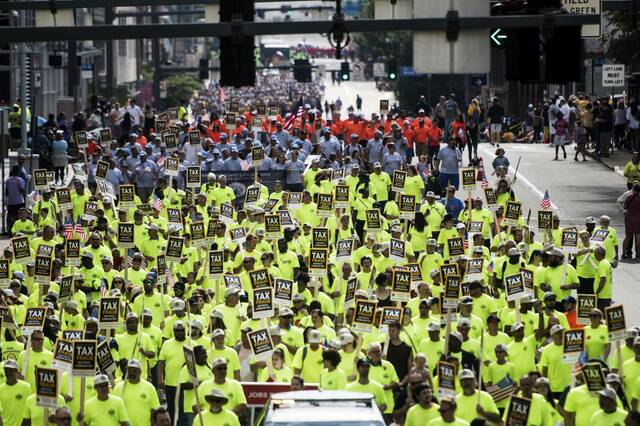America is home to a strong and storied labor movement that has fought many battles to empower workers and protect the rights of hard-working families. That includes in the proud union town of Pittsburgh, where I’m marching today in one of the oldest and largest Labor Day parades in the country. Today, we honor the nation’s workers, commemorate the countless victories of organized labor throughout our history, and recommit ourselves to the work that remains.
This Labor Day, I want to share some of what we’re doing at the Department of Labor to empower workers across the country, including here in Pittsburgh.
As we speak, President Biden’s economic agenda is delivering new roads, safer bridges, clean drinking water, and reliable broadband to neighborhoods across America. And these projects are also opportunities to create good union jobs — here in Pittsburgh, and in every corner of the country.
At the Department of Labor, our North Star is connecting workers to those good jobs in every community, especially workers who have been historically left out or left behind.
I can’t think of a better place than Pittsburgh to highlight the Labor Department’s efforts to partner with local leaders, labor unions, employer associations, and community-based organizations to create more pathways to the middle class; and to showcase the impact of the Biden-Harris administration’s plan to Invest in America by investing in America’s workers.
Earlier this year, the administration selected Pittsburgh as one of five cities designated as an Investing in America Workforce Hub, and Pennsylvanians are already seeing the results of massive public and private investments to strengthen and rebuild the region’s infrastructure, including through a $20 million federal investment in modernizing the terminal at Pittsburgh International Airport.
The Terminal Modernization Project alone is going to generate $2.5 billion in economic activity, use made-in-America steel, and create thousands of jobs for the local community.
In order to keep this progress going and to deliver on the promise of good jobs in every community, we need to continue recruiting, training, and hiring local workers to rebuild our nation’s infrastructure and to create a diverse, skilled workforce pipeline that includes veterans, Black workers, women, people with disabilities, workers of color, rural workers, justice-impacted individuals, those without a four-year degree, and more.
The workforce system is infrastructure too — the roads and bridges that connect workers to the good jobs they want and need, and employers to the people they want and need. And this workforce system, just like our physical roads and bridges, needs some attention too. It’s got some cracks and some potholes, and it doesn’t connect to all communities the way it should.
Under Biden’s leadership, we’re creating a workforce system infrastructure that’s going to be as strong as the physical infrastructure we’re building.
That’s why we’re working closely with unions, employers, colleges, community organizations and workforce boards on the ground, and local leaders like Mayor Ed Gainey, to create new workforce training programs that are building pathways to all the good jobs we’re creating from these public and private investments.
Workforce programs should be worker-centered and demand-driven — designed to equip workers with the skills they need to obtain good jobs that lead to careers, so that they’re prepared to get to work the moment the shovel hits the ground. The best way to do this way is through labor-management partnerships, which bring together employers and labor from the beginning to develop training programs that are specifically tailored to meet a region’s workforce needs.
One example of workforce training done right is PIT2Work, a federally funded pre-apprenticeship program that was created in partnership between the airport and Partner4Work, the local workforce board. The program is intentional about recruiting folks from traditionally marginalized communities, including workers of color — in fact, 90% of the first cohort was made up of Black Americans.
Additionally, trainees are paid, so they can earn-as-they-learn, and they receive wraparound support services, including transportation and child care on-site, so individuals can pursue these careers without having to worry about borrowing a friend’s car or finding care for their kids.
Workforce training done right means that training programs end in a good job — not a job search.
When I was in Pittsburgh in July, I met Robert, whose story illustrates the power of the good jobs we’re creating and the pathways to the middle class we’re building.
Robert knew early on that getting a four-year degree wasn’t the right path for him. After high school, he took a job as a fast-food worker, then as a convenience store manager. When Robert found out he was going to be a new father, he knew he needed a change. He could barely support himself on his income at the time — how was he going to support his family?
Robert discovered a training program that gave him a pathway to an Operating Engineers apprenticeship program. Now, Robert is a crane operator at the airport. He earned more in his first week at his union job than he made in a month at his prior jobs.
As Biden says and as Robert’s story demonstrates: a job is about more than a paycheck, it’s also about dignity. Today, Robert is proud — proud that that he has been able to buy a house for his family, and proud to one day tell his son that he helped to build the airport terminal.
That’s Bidenomics in action: working in partnership with local leaders and communities to empower workers, connect them to good jobs with family-sustaining wages, and give more families a path to the middle class.
It’s the same path that helped Robert take care of his family; that put “Union Joe” in the White House; and that gave me the opportunity to serve as your acting labor secretary. It’s the honor of my lifetime, and I promise to work as hard as all of America’s workers to get the job done right.
Julie Su is U.S. acting secretary of Labor.








